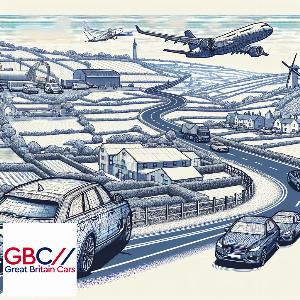London Airports: Preparing for Air Minicabs

Introduction of Air transfers in London Airports
London airports are gearing up for a revolutionary change in air travel with the introduction of air transfers. This innovative mode of transportation is set to redefine the concept of urban mobility, offering a faster and more efficient way to travel. Air transfers, essentially small aircrafts designed for short distances, are expected to alleviate congestion and reduce travel times significantly. London airports, including Heathrow, Gatwick, and London City, are preparing for this transformation by investing in infrastructure and technology to accommodate these new vehicles. The introduction of air transfers will not only revolutionize the way we travel but also contribute to reducing carbon emissions, as many of these air transfers are electric. As London airports prepare for this exciting new era of air travel, passengers can look forward to a more streamlined and efficient travel experience.
Infrastructure Changes for Air transfers
London airports are gearing up for a significant shift in air travel with the introduction of air transfers. This innovative mode of transport is expected to revolutionize the way passengers commute to and from airports, promising a faster, more efficient travel experience. To accommodate this, London airports are undergoing significant infrastructure changes. The primary focus is on creating dedicated take-off and landing pads for these air transfers. These pads, also known as 'vertiports', will be equipped with charging stations for electric air transfers, ensuring a seamless transition towards sustainable aviation. Additionally, modifications are being made to air traffic control systems to manage the anticipated increase in air traffic. The introduction of air transfers also necessitates changes in regulatory frameworks. Authorities are working on developing safety and operational guidelines to ensure a smooth integration of air transfers into existing air traffic. These infrastructure changes are a testament to London's commitment to embracing innovative technologies and sustainable practices in aviation. The city is setting a precedent for others to follow, paving the way for the future of air travel.
Regulations and Policies for Air transfers
As London airports prepare for the advent of air transfers, a new set of regulations and policies are being developed to ensure safety and efficiency. The Civil Aviation Authority (CAA) is at the forefront of this initiative, working closely with air transfer operators to establish guidelines for operations, maintenance, and safety standards. Key considerations include air traffic control integration, noise pollution, and passenger safety. The CAA is also working on policies for licensing air transfer pilots and operators, with stringent requirements to ensure only the most qualified individuals are allowed to operate these vehicles. Furthermore, the environmental impact of air transfers is a significant concern, prompting the development of policies aimed at minimising carbon emissions. As London airports gear up for this new era of transportation, these regulations and policies will play a crucial role in shaping the future of air transfer services in the city.
Impact on Traditional Airlines
The advent of air transfers is set to revolutionize the aviation industry, and traditional airlines operating in London airports are bracing for the impact. This new mode of transport promises to offer quick, efficient, and eco-friendly travel, potentially disrupting the current market dynamics. Traditional airlines are now faced with the challenge of adapting to this innovation or risk being left behind. They must rethink their operational strategies, invest in new technologies, and possibly collaborate with air transfer companies to stay relevant. The introduction of air transfers also means London airports need to prepare for changes in infrastructure, traffic management, and safety regulations. While the transition may be challenging, it also presents opportunities for growth and diversification. The impact of air transfers on traditional airlines and London airports is undeniable, and how they respond to this change will shape the future of aviation.
Environmental Considerations of Air transfers
As London airports prepare for the advent of air transfers, several environmental considerations are being taken into account. The introduction of air transfers promises to revolutionize transportation, offering a faster and more efficient means of travel. However, the environmental impact of these vehicles cannot be overlooked. Air transfers, like any other form of transportation, will contribute to carbon emissions. However, many companies are developing electric air transfers, which could significantly reduce their carbon footprint. Noise pollution is another concern, as air transfers could potentially create more noise than traditional ground vehicles. To mitigate these potential issues, London airports are exploring various strategies. These include the use of renewable energy sources to power air transfers, implementing strict noise regulations, and investing in advanced technology to improve efficiency and reduce emissions. In conclusion, while air transfers hold great potential for improving transportation in London, it is crucial that their environmental impact is carefully managed. This will ensure that the benefits of air transfers are not outweighed by their environmental costs.
Economic Implications of Air transfers
The advent of air transfers is set to revolutionize the transportation landscape in London, with significant economic implications for the city's airports. As the technology matures, London airports are preparing for a future where air transfers are a common sight. This new mode of transport promises to ease congestion, reduce travel times, and provide a more sustainable alternative to traditional transfers. Economically, air transfers could generate substantial revenue for airports through landing fees, maintenance services, and passenger amenities. They could also stimulate job creation in sectors such as air traffic control, engineering, and customer service. However, the transition will require significant investment in infrastructure, training, and regulatory compliance. Airports will need to build vertical take-off and landing pads, invest in air traffic management systems, and ensure safety standards are met. Despite these challenges, the economic potential of air transfers is undeniable. As London airports gear up for this exciting future, the city could become a global leader in urban air mobility.
Technological Requirements for Air transfers
As London airports prepare for the advent of air transfers, several technological requirements must be met to ensure safe and efficient operations. Firstly, advanced navigation systems are crucial. These systems must be capable of managing complex air traffic, avoiding collisions, and ensuring precise landing and takeoff. Secondly, robust communication systems are needed to facilitate real-time data exchange between air transfers, control towers, and other aircraft. Additionally, electric propulsion technology is essential to reduce noise and carbon emissions. This requires significant advancements in battery technology to increase flight duration and reduce charging times. Furthermore, autonomous flight technology is a key requirement. While initial air transfers may have pilots, the long-term goal is full autonomy, necessitating sophisticated AI and machine learning algorithms. Lastly, infrastructure for takeoff, landing, and charging must be developed. This includes building vertiports in strategic locations and installing high-speed charging stations. As London airports gear up for this revolutionary mode of transport, these technological requirements will play a pivotal role in shaping the future of urban air mobility.
Public Perception and Acceptance of Air transfers
The concept of air transfers is gradually gaining traction in London, with the potential to revolutionize the way people travel to and from airports. As congestion on the roads continues to increase, the idea of flying transfers is becoming more appealing to the public. A recent survey revealed that a significant percentage of Londoners are open to the idea of air transfers, citing reduced travel time and environmental benefits as key factors. However, there are still concerns about safety, noise, and cost that need to be addressed. As we prepare for the advent of air transfers, it is crucial to engage the public in discussions about the potential benefits and challenges. This will not only help to shape the development of the technology but also ensure that it is accepted and embraced by the people it is designed to serve. The future of air transfers in London looks promising, but public perception and acceptance will play a pivotal role in its success.
Potential Challenges and Risks of Air transfers
As London airports prepare for the advent of air transfers, several potential challenges and risks emerge. The primary concern is safety. Air transfers will share airspace with commercial aircraft, helicopters, and drones, increasing the risk of mid-air collisions. The integration of air transfers into existing air traffic control systems will require significant technological advancements and regulatory changes. Another challenge is noise pollution. Although electric air transfers are quieter than traditional helicopters, they could still contribute to noise pollution, particularly in densely populated areas. Infrastructure is another hurdle. London airports will need to build vertiports for air transfers to take off and land vertically. This will require substantial investment and space, which is at a premium in London. Lastly, there are environmental concerns. While electric air transfers are more environmentally friendly than traditional aircraft, their widespread use could still contribute to carbon emissions. In conclusion, while air transfers hold great promise for revolutionising urban transport, they also present significant challenges that London airports must address.
Future Prospects of Air transfers in London
The future of transportation in London is set to take a dramatic turn with the introduction of air transfers. London airports are already preparing for this revolutionary change, which promises to significantly reduce travel time and congestion in the city. The concept of air transfers, essentially small, drone-like vehicles capable of carrying passengers, is not far from becoming a reality. Companies like Uber and Airbus are investing heavily in this technology, with trials already underway in several cities around the world. For London, a city known for its heavy traffic and long commute times, air transfers could be a game-changer. London airports are gearing up for this change, with plans to create infrastructure that can accommodate these new vehicles. This includes building vertical take-off and landing pads, and integrating air transfer services into existing transport networks. The future of air transfers in London looks promising, with the potential to transform the city's transportation landscape.
Our Latest Blog Posts

Air Minicabs: Todays Innovation, Tomorrows Norm
Blog about Air transfers: Todays Innovation, Tomorrows Norm

Luton to Shropshire Hills Trip – Great Britain Cars
Travel from Luton to the Shropshire Hills for a scenic escape with stunning views and rich history – Great Britain Cars

Air Minicabs Heathrow Airport: A New Era of Transportation
Blog about Air transfers Heathrow Airport: A New Era of Transportation

Discovering the Best of British Gardens from London Airports
Blog about Discovering the Best of British Gardens from London Airports
Blogs Pages
Heathrow to the Gateway of the West Country: Somerset and Beyond

Blog about Heathrow to the Gateway of the West Country: Somerset and Beyond...
Scenic Routes: Discovering Britains Countryside from Londons Airports

Blog about Scenic Routes: Discovering Britains Countryside from Londons Airports...
London Airports: Preparing for Air Minicabs

Blog about London Airports: Preparing for Air transfers...
Jet Lag Strategies: Recovering After Long-Haul Flights

Blog about Jet Lag Strategies: Recovering After Long-Haul Flights...
Our Clients Testimonials

Fair values
It has fair values, kind , polite ,conversational and very helpful driver and pleasant too.
Emma





Kindest behaviour
The drive was so polite and kind . Besides this he was helpful and nice also.
Alexander





Remarkable help
It is astoundingly fantastic help and it's also reliable and on time for the most part. I'm genuinely amazed by it.
Anna





Basic booking
Basic booking and the driver was on time , aware and strong.
Nathan





Solid and kind
The driver was entirely dependable, supportive and kind .His way of behaving was simply delightful.
Hannah





Fair attributes
It has fair attributes, kind , pleasant ,conversational and unbelievably solid driver.
Hill





Best opportunity
The driver was no doubt reliable, strong and kind .His approach to acting was just wonderful.
Logan





Extraordinary cab
Extraordinary cab and magnificent can support. Agreeable seats every single thing they are giving.
Nancy





Great service
It is very great service and it's also reliable and on time always. I am really impressed by it.
Aana





Fair qualities
It has fair qualities, kind , well mannered ,conversational and extremely supportive driver.
Sophia





Fundamental booking
Fundamental booking and the driver was on time , mindful and solid.
Jackson





Great pick ups
They jolt of energy on the specific time. They give totally best.
Donald





Safe
Great Britain Cars cab is mostly safe cab. One can travel secure with them.
John





Key booking
Key booking and the driver was on time , careful and strong.
Moore





Easy approach
Booking of Great Britain Cars cab is easiest and totally satisfying.
Daniel





Upkeep
The vehicle is all around kept up with and cleaned . It was exceptionally fair.
Joshua





Fair credits
It has fair credits, kind , wonderful ,conversational and unimaginably strong driver.
Baker





Best servive
The vehicle is by and large around remained mindful of and cleaned . It was especially fair.
Perez





High benefits
The vehicle is overall around stayed aware of and cleaned . It was particularly fair.
Miller





Dependable
The driver was so dependable and arrived at in legitimate time which was so great.
Grace




